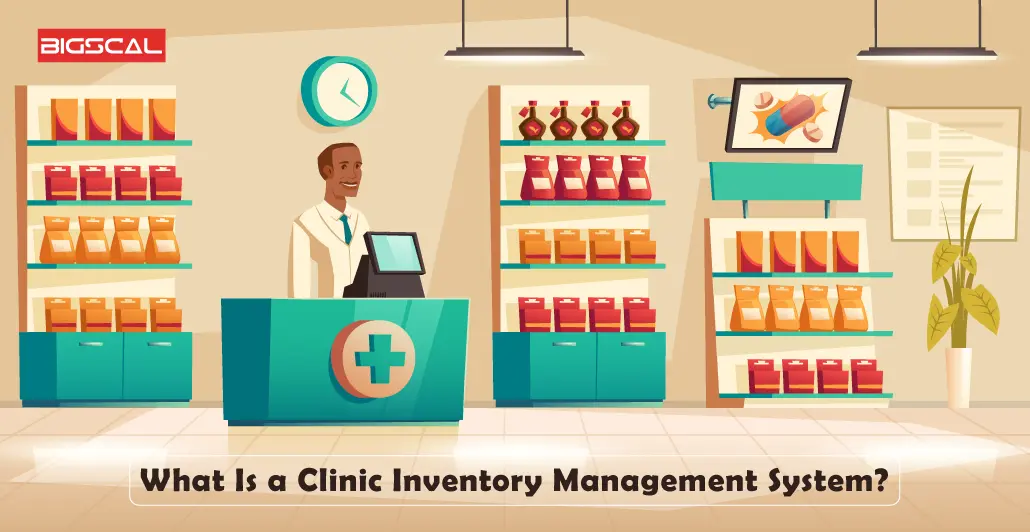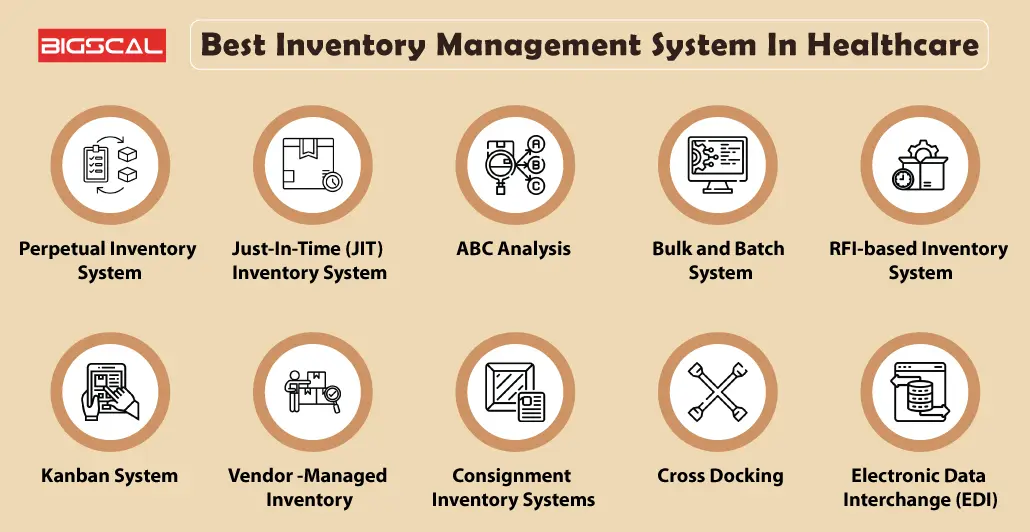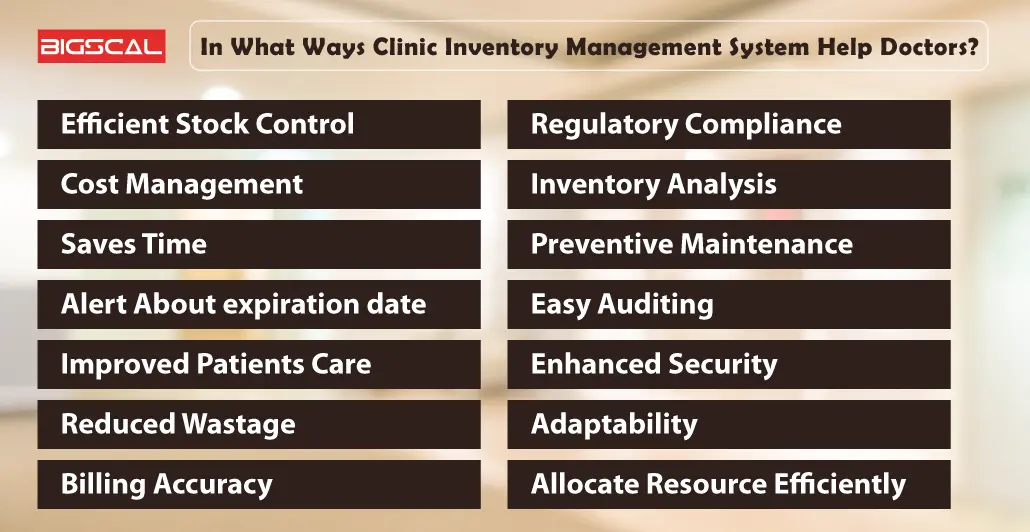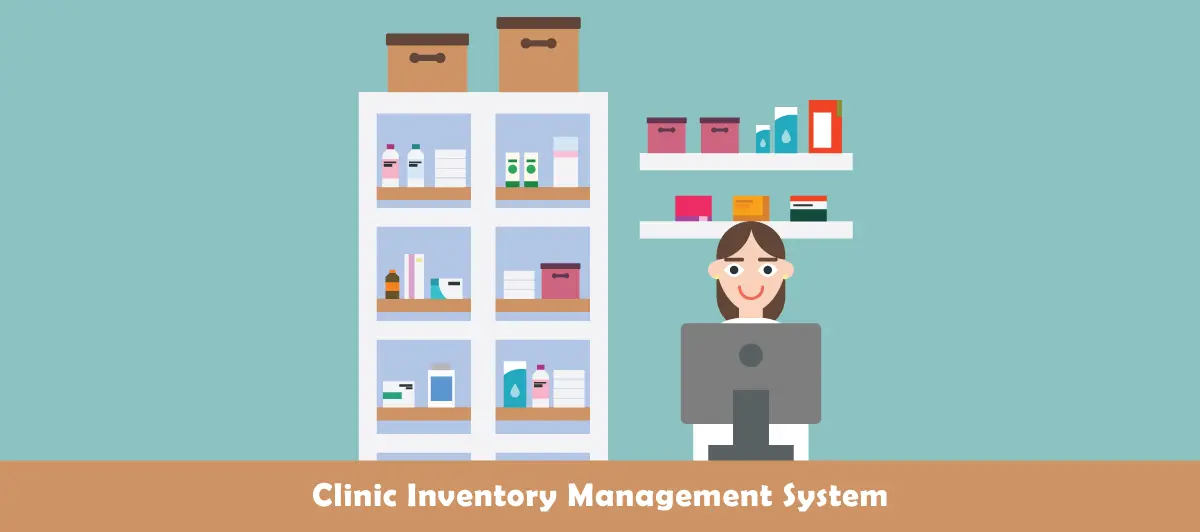How Clinic Inventory Management System Helps Healthcare Providers
Quick Summary: You all must hear about the Clinic Inventory Management System. It simplifies all operations within clinics by tracking inventory and organizing all medical equipment and supplies. That’s not the end, this system helps doctors in various ways. Let’s understand it in depth by reading this blog.
Introduction
Managing inventory effectively and efficiently is necessary for doctors to run their clinic smoothly. Hence, a Clinic Inventory Management System is important to well manage inventory and handle all operational tasks within a clinic. It simplifies complex inventory management tasks, of tracking and organizing medical supplies, equipment, and pharmaceuticals.
From enhancing accuracy of the supply chain management process by automating inventory tracking to minimizing the risk of errors and ensuring that essential items are always in stock. It promotes cost-effectiveness by preventing overstock or stockouts, optimizing the supply chain process and procurement, and reducing wastage. Additionally, the system improves patient care by ensuring that necessary medical resources are readily available when needed.
There are more ways in which CIMS helps doctors and there is more importance of inventory management in hospitals, healthcare systems and other healthcare facilities. healthcare
We will discuss everything so read it on!
What Is a Clinic Inventory Management System?

A clinic inventory management software and system is a type clinic management solution and software. It is a digital tool that helps clinics by simplifying tasks. It simplifies healthcare inventory management tasks by automating processes like order placement, stock monitoring, and expiration date tracking.
By streamlining these tasks, the system ensures clinics have the right medicines and equipment when needed, minimizing waste and improving patient care. It is like a digital assistant for the healthcare facility staff, ensuring supplies are well-managed, reducing human error and errors, and optimizing the overall functioning of the clinic.
Best Inventory Management System In Healthcare

Listing down some best hospital inventory management software systems, have a look:
- Perpetual Inventory System
- Just-In-Time (JIT) Inventory System
- ABC Analysis
- Bulk and Batch System
- RFI-based Inventory System
- Kanban System
- Vendor -Managed Inventory
- Consignment Inventory Systems
- Cross Docking
- Electronic Data Interchange (EDI)
In What Ways Clinic Inventory Management System Help Doctors?
Just like clinical data management software, CIMS also benefits doctors in various ways; let’s have a look:

Efficient Stock Control
A Clinic Inventory Management System is important in ensuring doctors have the proper medical supplies. Efficiently tracking stock levels prevents situations where essential inventory items run out unexpectedly. This real-time monitoring of inventory items helps clinics avoid treatment interruptions and enhances overall, quality patient care.
Additionally, doctors medical staff can quickly check the availability of medicines, surgical instruments, and other necessary items, streamlining their workflow. This system minimizes the risk of stockouts and expiration of medications, contributing to a more reliable and consistent healthcare service.
Cost Management
Effective cost and inventory management in the healthcare sector is necessary for any serious medical facility or practice, and a Clinic Inventory Management System aids in achieving this goal. It provides an overview of inventory-related expenses, helping doctors identify areas for cost savings and optimization. By maintaining optimal stock levels and preventing excess inventory, doctors can avoid unnecessary costs associated with storage, expiration of medicines, and potential waste.
The system helps track usage patterns, allowing doctors to negotiate better deals with suppliers based on accurate data rather than speculative estimates. Additionally, the system aids in identifying cost-effective alternatives without compromising the quality of medical supplies. By strategically managing the clinic’s inventory, doctors can redirect saved resources towards improving patient care, investing in advanced medical technologies, or enhancing other aspects of the healthcare facility.
Saves Time
Just like a well-constructed clinic appointment management system saves time, CIMS too helps doctors by saving their valuable time. It is a boon for doctors as it efficiently saves their valuable time. By automating the healthcare inventory management and tracking process, doctors no longer need to manually monitor and reorder supplies.
The system streamlines the hospital software entire inventory management process and workflow, from tracking stock levels to generating reorder alerts.
That way, it does away with dull manual data-keeping, so doctors can handle patients care and more medical work less. The time formerly accounted for unwelcome warehouse tasks can now be used on the provision of deliverables that will ensure quality healthcare and advance the overall efficiency of the Local Health Clinic.
Alert About expiration date
It also provides a series of patient safety alerts on the expiration date of medical supplies which helps to minimize damage caused by the improper use of medical products. It does not allow people to use expired medications or supplies; hence, patient care is safe and effective with proper medication or supply. This element, on the one hand, saves the patient’s health but at the same time provides doctors with the ability to be in line with the standards of their regulatory bodies.
With the expiry dates in hand, doctors are elevated to the level of confidence as they avoid problems associated with medical recordUpdating.
Improved Patients Care
Running a clinic inventory management is a vital duty as it allows for no operational costs and provides MedCells and resources on time. It improves case management, so the doctors are more engaged in patient’s examination and treatment.
Specializing in straightforward inventory procedures, medical professionals. Henceforth, eliminate the problem of delays and they can ensure a smooth care for their patients. This system is beneficial to medical staff since they can manage the inventory and avoid situations where, medical supplies run out unexpectedly this way. The doctors will be guaranteed to avail the necessary supplies at the right time without being interrupted from attending to their patients.
Reduced Wastage
By implementing an effective Inventory management system in hospitals, doctors can minimize wastage inventory management in hospitals and clinics as it prevents expiration and spoilage of medical supplies. The system provides accurate tracking of inventory levels. Which enable doctors to use items before they reach their expiry dates. This not only saves costs of expired goods but also ensures the optimal use of resources.
By reducing wastage, clinics and many hospitals can allocate resources more effectively. It also leads to cost savings that improve patient care and upgrade medical facilities. The streamlined and automated inventory management and control processes contribute to a more sustainable and cost-effective healthcare environment.
Billing Accuracy
A Clinic Inventory Management System ensures billing accuracy for doctors. By automating inventory tracking of medical supplies and medications, it helps prevent errors in invoicing. The automated system keeps a real-time record of items used during patients’ care, reducing the chances of miscalculations or missing charges.
Additionally, this also simplifies the billing process and enhances transparency. It instills confidence in doctors and patients regarding the accuracy of financial transactions.
Regulatory Compliance
The Clinic Inventory Management System aids doctors in maintaining regulatory compliance effortlessly. It sets expiry date of medicines, dictates monthly stock updates and keep track of the appropriate storage conditions to be followed.
It is the threat of non-compliance with the rules, risk to lose patients’ information and it causes legal problems that this approach effectively does. The system further supports quick and convenient search in the supply detail utilized for inventories. It allows medical facilities, personnel and doctors to be on the required standard which has been registered by health authority. Also, it improves the productivity, therefore enhancing compliancy of the healthcare environment.
Inventory Analysis
The medical inventory management control systems allow doctors to do a good job in examining this process. The relationship between department managers and ward-in-charge enables efficient management of the stock status of various departments. Doctors are helped to track the products they need, have access to information about the expiry dates for different items. It is crucial data about the usage patterns from different wards.
In addition, in this way the necessary goods are always in stock which lowers the chance of issues with stock during essential situations. Social platforms make it easier for doctors to monitor, plan for demand, and use optimized inventory management techniques. Since these systems provide real-time feedback on inventory tracking, demand planning, and inventory management. Furthermore, it facilitates better delivery of quality healthcare services as well as lowering of healthcare costs.
Preventive Maintenance
The inventory management system in the hospital facilities assists in the preventive maintenance and determines the equipment replacements supplies and all their due dates on when they should be serviced/maintained. The technology that the doctors depend on, medical devices and equipment, plays a vital role in helping them deliver care at an optimal level. Such systems assist in avoiding uncertain failures caused by adopting an orderly maintenance plan. The next sentence will additionally discuss the societal concerns surrounding toxins released into the environment.
Furthermore, doctors can schedule inspections and service at the appropriate interval, making sure that equipment works optimally at all times. It significantly minimizes the likelihood of failures that can undermine clinical practice. The following concept of equipment maintenance does not only prolong the lives of critical devices but also add value to the medical system-clinic’s efficiency and reliability.
Easy Auditing
Hospital inventory management software simplifies auditing for doctors by providing a simplified process for tracking and managing healthcare supply chains. With this system, doctors can easily monitor stock levels, track inventory usage, and trends in inventory movement.
The automated tracking feature helps in quick reconciliation of stock. It reduces the likelihood of errors in manual record-keeping. This not only saves time but also ensures accuracy in inventory management. Doctors can generate detailed reports on demand, making audits more efficient and effective.
Moreover, the system promotes transparency and accountability in handling medical resources. It contributes to the smooth functioning of medical staff in the clinic.
Enhanced Security
Clinic Inventory Management Systems enhance security by implementing access controls and real-time monitoring. Doctors can restrict access to sensitive medical inventory data. This will ensure that only authorized personnel can view or modify information. It helps in preventing unauthorized access and potential mishandling of supplies.
Additionally, the system maintains a log of all transactions and user activities, allowing doctors to trace any discrepancies or suspicious actions. The system adds an extra layer of protection by incorporating secure authentication measures, such as passwords or biometrics.
In this way, the enhanced security clinic management system features protect valuable medical assets and maintain the integrity of the clinic’s inventory management processes.
Adaptability
The Clinic Inventory Management System makes work of doctors easier and quicker as well because of its interactive nature. It facilitates a smooth integration between clinic processes and supports different needs, whether these are simple or complex. … Such a flexibility make the system not only easy to be adjusted but enables it to go along with the changes in inventory needs as well.
Such changes include demand fluctuations for medicines, the biggest added category being medical supplies which play an important role in medicine management. Personalization as well as the capacity to scale becomes a reality as doctors can customize their software to fit the exact recording and health reporting needs for their clinic. Consequently, its resilience is enhanced since it develops an uninhibited and adaptable context.
Smooth Workflow
hospital inventory system systems gain prominence in the field of healthcare due to their ability to automate the management of inventory. Moreover, it electronically follows up with all these procedures. These procedures includes such as stocking, ordering, and updating. Thus, the doctors won’t be exhausted with too many tasks. The efficacy helps to minimize the risk of errors. It also make sure the existence of every urgently necessary medical equipment and supplies at all times.
Furthermore, enhancing the workflow helps health care providers allocate their time in a meaningful way. It is the service product that yields the proper delivery of a clinic with its patients.
Allocate Resource Efficiently
Healthcare inventory management software or systems play a key role in maximizing the doctors’ productivity. It provides them with appropriate tools to ensure resources are properly managed. A comprehensive healthcare inventory management system can help healthcare organizations exactly at the right time with maintaining and running a correct and real-time supply chain model. It also allows them to optimize their resources usage.
Furthermore, it ensures that essential items are always available as per requirements. It prevents unnecessary delays in patient care. With a clear view of stock levels, doctors can make wise decisions about restocking supplies and with that they can reduce the risk of running out of essential items.
Moreover, the effective allocation of resources through the CIMS allows medical personnel to concentrate more on patient care and less on logistical challenges.
How Can Bigscal help you to have your own Clinical Inventory Management Software?
Do you need your own CIMS? Become our partner, see how we can help you in creating your own hospital inventory management systems. We at Bigscal provide a range of services. These services include software development, customization, and integration. We offer expertise in creating user-friendly interfaces. Further, we can also help you to implement the inventory management best practices, tracking features and ensure compliance with industry standards including HIPAA.
Additionally, we will also provide ongoing support and maintenance for the healthcare inventory management software, which will ensure the optimal functionality. So, to know more about us you need to reach out to us directly.
Conclusion
As we are concluding this blog here, we hope we will be able to provide all relevant info about the importance of inventory management in your healthcare facilities or clinics. So, now when you have read about it, it’s time to harness CIMS/HIMS in your clinic. It will simplify all your tasks and increase overall efficiency.
FAQ
Why is inventory management important in the healthcare industry?
Inventory management is indispensable in all healthcare systems for the purpose of having always onhand the supplies as expected, preventing shortage elevation and avoiding excesses of the ones that are unneeded. More effective inventory control decreases patient care by eliminating treatment delay, minimizing expenditure, and maintaining safety with conditioners standards. In addition, it provides a sounder basis to strengthen the healthcare system.
What are the 4 types of inventory control and inventory management techniques?
Following are 4 main techniques of inventory management in healthcare organizations:Following are 4 main techniques of inventory management in healthcare organizations:
- ABC analysis: It is particular in the accordance with worth.
- Just-In-Time: It convert stock levels to small primarily to cut holding costs.
- Economic Order Quantity: It is an effective way to get order quantity per our cost economy.
- Safety Stock: It supports this by creating a buffer to reduce the impact of uncertainties and to maintain stock representation.
What is the role of inventory management in the supply chain costs of a hospital?
Stock inventory is the important feature of the supply chain costs of a hospital because of the possibility of stock reordering when needed, holding cost optimization, and reduction of the risk of stock outs. The topmost priority of Hospital Inventory Control Systems is to ensure easy access to required supplies on time, reduce costs by using the most efficient methods, and thereby, contribution to the resilience and efficiency of healthcare supply chain.
How do hospitals keep track of inventory and labor costs?
Hospitals apply inventory management systems which utilize technologies including scanning/RFID to monitor ware content. For the salaries workforce, they are using HR software that encompasses attendance and time tracking. Through these technologies, all processes of real-time monitoring, analysis and strategic decision making will be prompt in order to operate optimally both in the context of reducing your cost of inventory and reducing labor costs.
What is inventory management in the healthcare business?
Inventory management in the healthcare sector necessitates the supervision of supply procurement, warehousing (in the case of goods that need to be stored) and supply distribution. This policy is designed to create a balance; creating a helpful environment free from shortages and losses. Efficient inventory control is a must because it ensures that patients receive high quality care, that there is no wastage and adherence to the ethical standard is in place in healthcare institutions.





